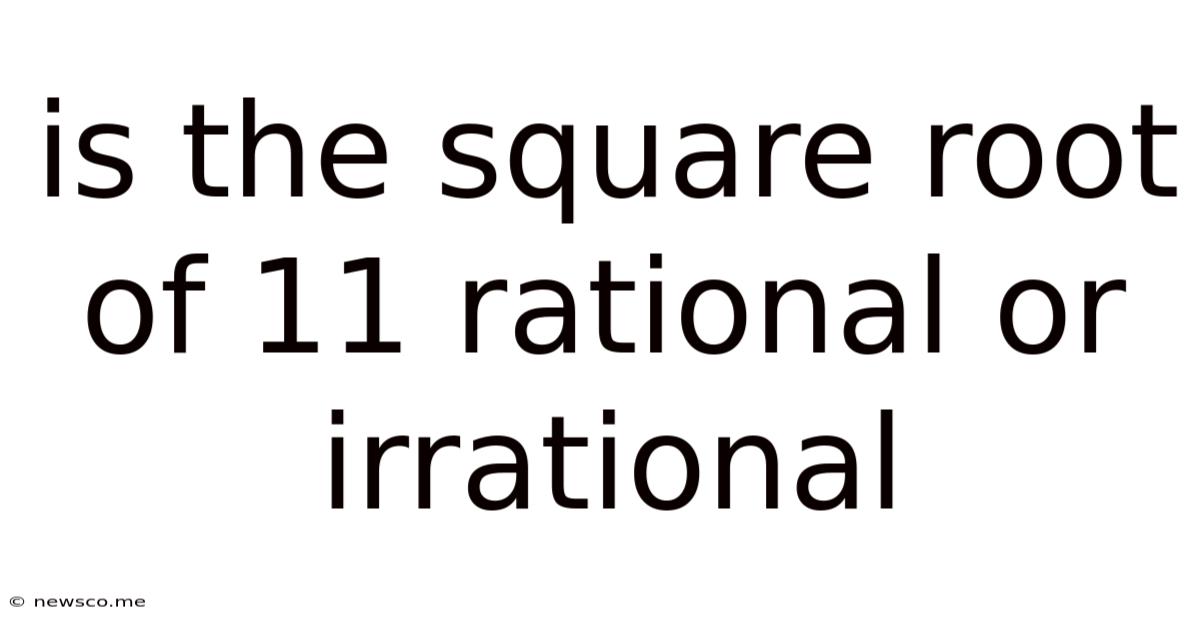Is The Square Root Of 11 Rational Or Irrational
News Co
Apr 02, 2025 · 4 min read

Table of Contents
Is the Square Root of 11 Rational or Irrational? A Deep Dive into Number Theory
The question of whether the square root of 11 is rational or irrational might seem simple at first glance. However, understanding the answer requires a journey into the fascinating world of number theory, exploring the fundamental differences between rational and irrational numbers, and employing proof techniques that solidify our understanding. This article will not only answer the question definitively but also provide a comprehensive exploration of the concepts involved.
Understanding Rational and Irrational Numbers
Before diving into the specifics of √11, let's establish a clear understanding of the core terms:
Rational Numbers: A rational number is any number that can be expressed as a fraction p/q, where p and q are integers, and q is not equal to zero. Examples include 1/2, 3/4, -5/7, and even integers like 4 (which can be expressed as 4/1). The decimal representation of a rational number either terminates (e.g., 0.75) or repeats in a predictable pattern (e.g., 0.333...).
Irrational Numbers: Irrational numbers cannot be expressed as a simple fraction of two integers. Their decimal representation is non-terminating and non-repeating. Famous examples include π (pi) and e (Euler's number). The square root of most non-perfect squares is also irrational.
Proving the Irrationality of √11
To determine if √11 is rational or irrational, we'll employ a classic proof by contradiction. This method assumes the opposite of what we want to prove and then demonstrates that this assumption leads to a contradiction, thereby proving the original statement.
1. The Assumption: Let's assume, for the sake of contradiction, that √11 is a rational number. This means we can express it as a fraction:
√11 = p/q
where p and q are integers, q ≠ 0, and the fraction p/q is in its simplest form (meaning p and q share no common factors other than 1).
2. Squaring Both Sides: Squaring both sides of the equation, we get:
11 = p²/q²
3. Rearranging the Equation: Multiplying both sides by q², we obtain:
11q² = p²
4. Deduction about p: This equation tells us that p² is a multiple of 11. Since 11 is a prime number, this implies that p itself must also be a multiple of 11. We can express this as:
p = 11k (where k is an integer)
5. Substitution and Further Simplification: Substituting p = 11k into the equation 11q² = p², we get:
11q² = (11k)²
11q² = 121k²
Dividing both sides by 11, we have:
q² = 11k²
6. Deduction about q: This equation shows that q² is also a multiple of 11. Again, because 11 is prime, q must be a multiple of 11.
7. The Contradiction: We've now shown that both p and q are multiples of 11. However, this contradicts our initial assumption that p/q is in its simplest form (i.e., that p and q share no common factors). If both p and q are divisible by 11, we could simplify the fraction further.
8. The Conclusion: Since our initial assumption leads to a contradiction, the assumption must be false. Therefore, √11 cannot be expressed as a fraction p/q, and it is irrational.
Exploring the Implications and Generalizations
The proof above demonstrates a fundamental property of irrational numbers. The same proof technique can be adapted to show the irrationality of the square root of many other non-perfect squares. The key is the presence of prime numbers in the equation that force divisibility constraints leading to a contradiction.
For instance, consider the square root of any prime number. You can follow a similar proof structure to show its irrationality. The key lies in the prime factorization and the inability to represent the root as a fraction in simplest terms.
Furthermore, this exploration highlights the rich structure within the number system. While rational numbers are neatly ordered and easily represented, irrational numbers add depth and complexity, showcasing the infinite and continuous nature of the real number line.
Further Exploration of Irrational Numbers
The concept of irrational numbers extends beyond simple square roots. Many mathematical constants, essential in various fields like geometry, calculus, and physics, are irrational:
-
π (Pi): The ratio of a circle's circumference to its diameter, approximately 3.14159... Its irrationality was famously proven centuries ago.
-
e (Euler's number): The base of the natural logarithm, approximately 2.71828... This number appears frequently in calculus and exponential growth/decay calculations.
-
The Golden Ratio (φ): Approximately 1.61803..., found in nature and art, possessing unique mathematical properties.
Conclusion: √11's Place in the Number System
The square root of 11 is definitively an irrational number. The proof by contradiction elegantly demonstrates that it cannot be expressed as a fraction of two integers, solidifying its place within the infinite set of irrational numbers. Understanding this proof not only answers the specific question about √11 but also enhances our comprehension of the fundamental differences and intricate relationships between rational and irrational numbers, enriching our understanding of the beauty and complexity of mathematics. This exploration showcases the power of mathematical reasoning and the elegance of proof techniques in unraveling seemingly simple yet profound mathematical truths. Further exploration into the realm of number theory reveals even more fascinating properties and relationships within the number system.
Latest Posts
Related Post
Thank you for visiting our website which covers about Is The Square Root Of 11 Rational Or Irrational . We hope the information provided has been useful to you. Feel free to contact us if you have any questions or need further assistance. See you next time and don't miss to bookmark.